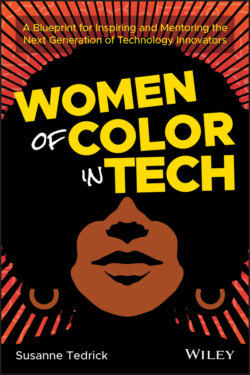Читать книгу Women of Color in Tech - Susanne Tedrick - Страница 9
Early Childhood
ОглавлениеThe number of young girls interested in STEM fields and activities starts to diminish in early childhood. This can be due to lack of active encouragement in their home and school environments, and the lack of role models who look like them in STEM fields in their lives.
Young girls, particularly those growing up in minority or foreign-born households, are more likely to be encouraged to perform gender-normative activities like playing with dolls or playing “house” and to be encouraged to take on caregiving responsibilities (like babysitting) rather than explore robotics or programming.
Even if girls can invest the time in these interests, parents may not be as supportive as they could be, as they believe that this could be a passing “tomboy” phase they are in, where they are engaging in behaviors and activities that are (perceived to be) normal only to boys. Parental support may be superficial or even contradictory. And some girls are just shamed outright for not conforming to what it means to be a “girl” by their culture and society's standards.
I remember volunteering at a girls-in-STEM career fair years ago—a young Hispanic girl approached the table along with her parents. She was looking intently at the Raspberry Pi that was sitting on the table but hadn't said a word for a few minutes. I eventually asked her if she had any questions about the Pi and how it worked. As I began to explain, she started to warm up and ask more questions. At one point, she stopped herself because she thought she was getting too “geeky.” I said, “Not at all”—I loved the enthusiasm and told her that this was a safe space to geek out!
Her parents, on the other hand, were not beaming with enthusiasm. In their defense, all-day career fairs can be energy- and time-consuming. But in general, they didn't appear to share in their daughter's excitement—not that they themselves needed to be interested in computing, but rather they didn't appear to share their daughter's enthusiasm in a possible career fit. When we were done talking and she shared what she had learned with them, they nodded appropriately, thanked me, and then quickly proceeded to another booth. As they moved, it almost appeared that the girl went back to a “shell-like” state, and her enthusiasm had gone away.
Another instance—again while volunteering at a girls-in-STEM event, this time geared toward young Black girls—was when I was watching one of the young girls interact with her mom. There was a break in the program, so she came over to give her mom a hug and kiss. As she ran off, the mother shook her head and said that while she loved her daughter, she was “special” for liking this sort of thing. From her tone, you could tell that she was implying something negative, as if there was something inherently wrong with her daughter having this interest. Studies have indicated that parental influence, encouragement, their own educational levels, and support are major factors in whether a student, male or female, chooses a STEM education or career. Parents who themselves have not studied STEM or are in those careers themselves may not strongly advocate or support their daughters pursuing those paths.
Even in the most supportive of households, however, parents' own feelings and attitudes on gender “norms” (behaviors and attitudes that they consider “normal” for each gender) may influence the degree of support they offer to their daughters. Parents are likelier to support their daughters doing well in their overall studies than directly suggest they pursue STEM education and careers. This may be due to their own perceptions of what they believe women can and are able to do. Parents may not realize that they are engaging in behaviors and patterns that may discourage young women.
Young Black girls who have low parental involvement, as well as less-than-ideal social and economic conditions in their homes, are even less likely to pursue STEM in college—assuming they are even able to go to college.
